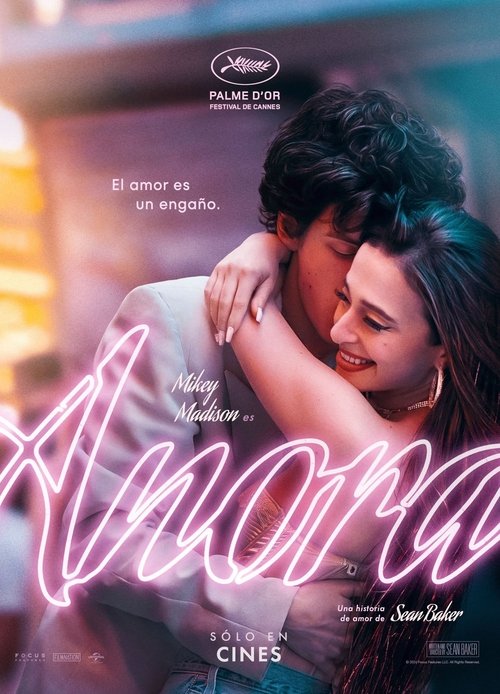
Antonio Alaminos-Fernández
8
|
mar. 26, 2025
**English review**
With Anora, Sean Baker delivers what may be the rawest and most subversively romantic film in this year’s Cannes competition — a whirlwind of languages, currencies, and contradictions. Disguised as a raucous Cinderella story, Anora is less Disney and more Safdie Brothers by way of Brighton Beach, telling the improbable but utterly believable love story between a New York stripper and the reckless heir of a Russian oligarch. In Baker’s hands, this familiar tale of people from different worlds falling in love is recharged with political tension, sexual agency, and biting social commentary. Though wrapped in neon and chaos, it’s a character-driven film with its heart firmly rooted in the grit of the working class.
The film’s protagonist, Ani (a stunning Mikey Madison), dominates every frame with a mix of strength, naiveté, and street-smart resilience. Ani doesn’t just dance for money—she navigates power, affection, and survival on her own terms. From her first lap dance with Ivan (Mark Eydelshteyn), a disarmingly sweet and clueless rich kid, Ani seizes control of a story that constantly tries to wrest it from her. The transactional nature of their initial encounters—negotiated with business-like clarity and a complete lack of moralism—gradually gives way to something messier and more sincere. Even as Ivan’s proposal veers into farce, Baker refuses to reduce their bond to parody. Instead, he finds in their intimacy both the vulnerability of youth and the harshness of adult compromise.
What could have been a whimsical Vegas wedding movie spirals instead into a far more volatile drama once Ivan’s powerful family enters the scene. The tonal shift is masterfully executed: Baker oscillates between comedy, suspense, and tragedy, capturing the surreal logic of a dream turned nightmare. As thugs and relatives descend on the newlyweds, the stakes rise not in violence, but in emotional disintegration. Ivan flees; Ani is left to weather the consequences. Yet through every beat of confusion and betrayal, the camera clings to her perspective, demanding our empathy and reminding us that she is not a footnote in someone else’s story, but the protagonist of her own. It’s an unexpected feminist triumph nestled within a chaotic romantic farce.
Ultimately, Anora stands as a fierce continuation of Baker’s ongoing cinematic argument: that sex workers are not only worthy of narrative centrality, but of love, complexity, and dignity. Madison’s Ani is not a victim, nor a cliché, but a fully-realized person—vulnerable and powerful, jaded yet hopeful. Through her, Anora transcends its premise and becomes a deeper meditation on class, gender, and the structures that regulate intimacy. Beneath the film’s chaotic energy lies a radical tenderness, one that believes in the possibility of connection even in a world driven by commodification. As with all of Baker’s best work, Anora demands that we look closely at the people we’re taught to ignore—and find, in them, something unmistakably human.
**Spanish review**
Con Anora, Sean Baker entrega lo que quizá sea la película más cruda y subversivamente romántica de la competición de este año en Cannes: un torbellino de idiomas, monedas y contradicciones. Disfrazada de una ruidosa historia de Cenicienta, Anora se aleja de Disney y se acerca más al estilo de los hermanos Safdie, con una escala en Brighton Beach, para narrar la improbable pero completamente creíble historia de amor entre una stripper neoyorquina y el heredero imprudente de un oligarca ruso. En manos de Baker, este relato familiar sobre personas de mundos distintos que se enamoran se recarga de tensión política, agencia sexual y una afilada crítica social. Aunque envuelta en neones y caos, se trata de una película centrada en sus personajes, con el corazón bien anclado en la dureza de la clase trabajadora.
La protagonista del filme, Ani (una deslumbrante Mikey Madison), domina cada plano con una mezcla de fortaleza, ingenuidad y resiliencia callejera. Ani no solo baila por dinero: navega el poder, el afecto y la supervivencia bajo sus propias reglas. Desde su primer baile privado con Ivan (Mark Eydelshteyn), un joven rico desarmantemente dulce e ingenuo, Ani toma el control de una historia que continuamente intenta arrebatárselo. La naturaleza transaccional de sus primeros encuentros —negociada con una claridad empresarial y una total ausencia de moralismo— va dando paso a algo más desordenado y sincero. Incluso cuando la propuesta de matrimonio de Ivan roza el absurdo, Baker se niega a reducir su vínculo a una parodia. En cambio, encuentra en su intimidad tanto la vulnerabilidad de la juventud como la dureza del compromiso adulto.
Lo que podría haber sido una película caprichosa sobre una boda en Las Vegas se transforma en un drama mucho más volátil una vez que la poderosa familia de Ivan entra en escena. El cambio de tono está ejecutado con maestría: Baker oscila entre la comedia, el suspenso y la tragedia, capturando la lógica surrealista de un sueño que se convierte en pesadilla. A medida que matones y parientes rodean a los recién casados, las apuestas aumentan no tanto por la violencia, sino por la desintegración emocional. Ivan huye; Ani queda enfrentando las consecuencias. Sin embargo, en cada compás de confusión y traición, la cámara se aferra a su perspectiva, exigiendo nuestra empatía y recordándonos que no es una nota al pie en la historia de otro, sino la protagonista de la suya. Es un triunfo feminista inesperado envuelto en una farsa romántica caótica.
En última instancia, Anora se erige como una continuación feroz del argumento cinematográfico que Baker ha venido desarrollando: que las trabajadoras sexuales no solo merecen un papel central en las narrativas, sino también amor, complejidad y dignidad. La Ani de Madison no es una víctima ni un cliché, sino una persona plenamente realizada: vulnerable y poderosa, desencantada pero esperanzada. A través de ella, Anora trasciende su premisa y se convierte en una meditación más profunda sobre la clase, el género y las estructuras que regulan la intimidad. Bajo la energía caótica del filme subyace una ternura radical, una que cree en la posibilidad de la conexión incluso en un mundo regido por la mercantilización. Como en lo mejor de la filmografía de Baker, Anora nos exige mirar de cerca a quienes hemos aprendido a ignorar, y descubrir en ellos algo inconfundiblemente humano.





















